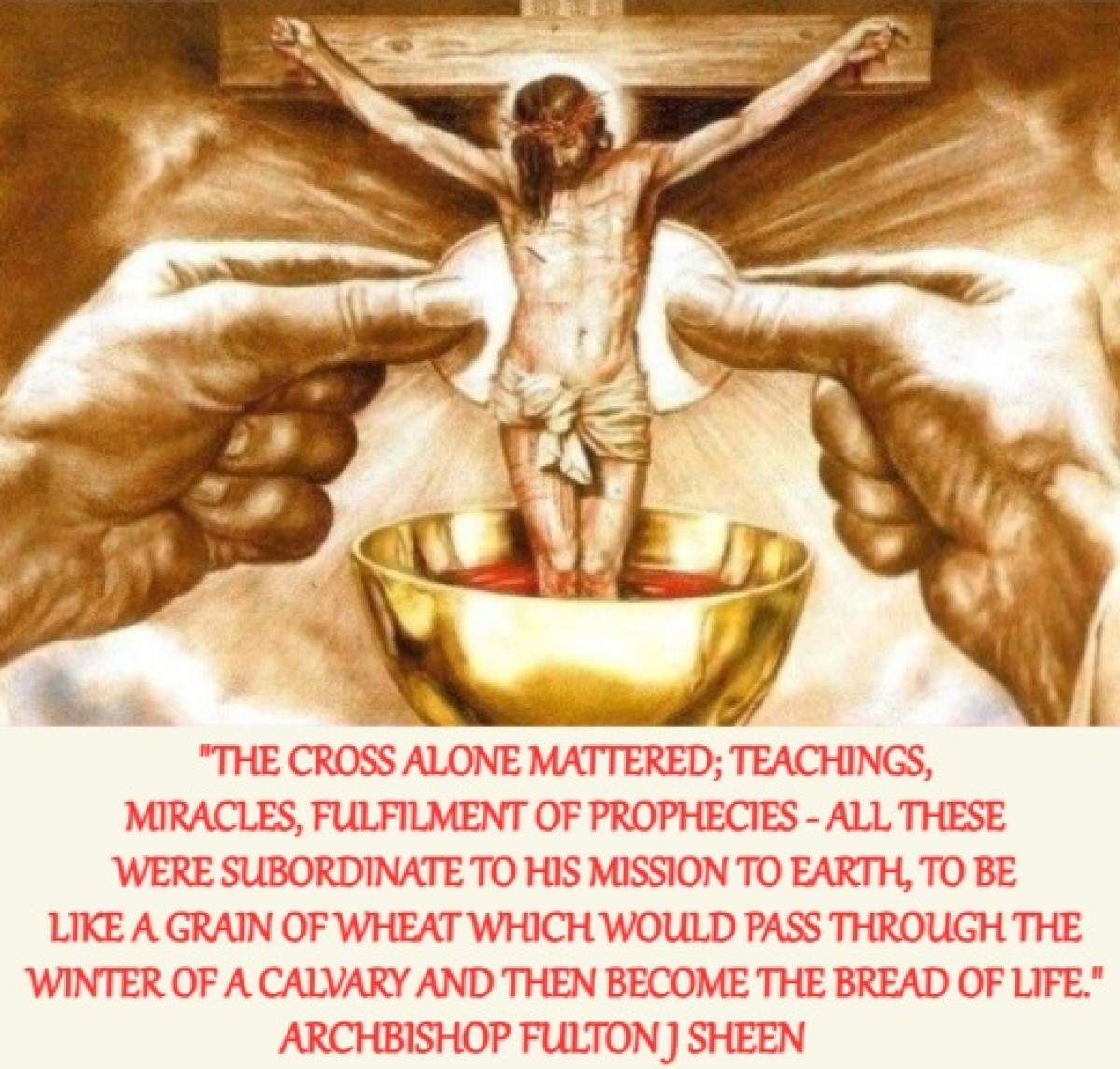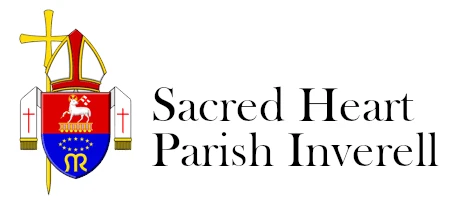5th Sunday of Lent (Year B) - 17 March
15th March 2024

“In all He did from the Incarnation to the Cross, the end Jesus Christ had in mind was the gift of the Eucharist, His personal and corporal union with each Christian, through Communion. He saw in It the means of communicating to us all the treasures of His Passion, all the virtues of His Sacred Humanity, and all the merits of His life.” - St Peter Julian Eymard
A reflection on today's Gospel by the Venerable Archbishop Fulton J Sheen:
"Not only to the Jews but also to the Gentiles Our Lord revealed the purpose of His coming, namely, to lay down His life for His sheep. The Gentiles were here represented by the Greeks. Because the Gentiles had not submitted to circumcision, they were forbidden access to the Sanctuary, but were permitted to circulate in the spacious Court of the Gentiles.
"The Pharisees had already complained that the 'whole world was running after Him.' As a proof of it, the Greeks, or the other sheep who were not of the fold, presented themselves to the Good Shepherd. While the enemies were plotting to kill Him, the Greeks wished to see Him. At His birth, the Wise Men of the East came to His cradle; now the Greeks, who were the Wise Men of the West, came to the Cross. Both the Magi of the East and the Magi of the West were to see a humiliation; in the first instance, God in the form of a Babe in Bethlehem, and in the latter, God in the form of a criminal on the Cross. As a sign leading to an understanding of His Divinity, the Magi were given the star; the Greeks, a grain of wheat.
"These Greeks had seen the triumphant entry into Jerusalem and must have been edified by the noble bearing of Our Lord. Perhaps what appealed most to them was the fact that Our Blessed Lord had cleansed the temple and said that His Father had made it 'a house for all nations.' This revolutionary concept must have deeply stirred the spirit of universalism which was a characteristic of the Greeks. When Andrew and Philip brought their request to Our Lord that the Greeks wanted to see Him, He answered: The Hour is now come for the Son of Man To achieve His glory.
"At Cana, Our Lord had told His mother that His 'Hour' had not yet come; during His public ministry no man could lay hand on Him because His 'Hour had not yet come' but here He announced, within a few days of His death, that the time had come when He would be glorified. The glorification referred to the lowest depths of His humiliation on the Cross, but it also referred to His triumph. He did not say the Hour was near for Him to die, but for Him to be glorified. He grouped Calvary and His triumph together as He would do after His Resurrection when speaking to the disciples on the way to Emmaus.
"To His followers the Cross presently seemed as the depth of humiliation; to Him it was the height of glory. But His words to the Greeks also meant that the Gentiles were to be a feature of His glorification. The wall dividing Jew and Gentile was to be broken down. From the first, He saw the full fruits of the Cross growing in heathen lands.
"To bring the lesson of Redemption home to the Greeks, He used an example from nature. He had often used many parables about seeds and sowing, and had called Himself a seed: 'The Word is the seed.' In one parable He likened His Mission to a seed falling on different kinds of ground, explaining the response different souls made to His grace. Now He revealed that His life would have its greatest influence through His death. Nature, He said, was stamped with a Cross; death is the condition of a new life. The disciples would have kept Him as a seed in the granary of their narrow lives. But if He did not die in order to give new life, He would be a Head without a body, a Shepherd without a flock, a King without a kingdom.
"Human nature, He was telling the Greeks, does not achieve greatness through poetry and art, but by passing through a death. It is likely that He even spoke of the 'grain of wheat' to infer that He was the Bread of Life.
"The Greeks had come to Our Lord saying, 'We wish to see Jesus,' probably because of the majesty and beauty of appearance which they revered so highly as followers of Apollo. But He pointed to His torn and battered self on a hill, and then added that only through the Cross in their lives will there ever be beauty of soul in the newness of life.
"He then paused for a moment as His soul was seized by a frightening apprehension of the Passion and being 'made sin,' of being betrayed, crucified, and abandoned. Out from the depths of His Sacred Heart welled these words: And now my soul is distressed. What am I to say? I will say, Father, save Me from undergoing this hour of trial; And yet I have only reached this hour of trial that I might undergo it.
"These are almost the same words that He used later on in the Garden of Gethsemane —words that are inexplicable except for the fact that He was bearing the burden of the world’s sins. It was only natural for Our Blessed Lord to undergo a struggle inasmuch as He was a perfect man. But it was not the physical sufferings alone which troubled Him; He, like Stoics, philosophers, men and women of all ages, could have been calm in the face of great physical trials. But His distress was directed less to the pain, and more to the consciousness of the sins of the world which demanded these sufferings. The more He loved those for whom He was the ransom, the more His anguish would increase, as it is the faults of friends rather than enemies which most disturb hearts!
"He certainly was not asking to be saved from the Cross, since He reprimanded His Apostles for trying to dissuade Him. Two opposites were united in Him, separated only in utterance: the desire for release, and submission to the Father’s will. By laying bare His own soul, He told the Greeks self-sacrifice was not easy. They were not to be fanatics about wanting to die, for nature does not want to crucify itself; but on the other hand, they were not to turn their eyes from the Cross in cowardly dread. In His own case, now as always, the most sorrowful moods pass into the most blissful; there is never the Cross without the Resurrection; the 'Hour' in which evil has mastery passes quickly into the 'Day' where God is Victor.
"At the very moment when He spoke of coming to this Hour to undergo it for the redemption of men: A voice came from heaven, I have made it known, and will yet make it known.
"The voice of the Father had come to Him on two other occasions when His Mission to the Cross was foremost: at His baptism, when He appeared as the Lamb of God to be sacrificed for sin; at His Transfiguration, when He spoke of his death to Moses and Elias while bathed in radiant glory. Now the Voice came, not in a river scene, not on a mountaintop, but above the temple, in the full hearing also of the representatives of the Gentiles. 'I have made it known,' could have referred to the Father’s glorification up to the moment of His death; 'and I will yet make it known,' could have referred to its fruits after the Resurrection and Ascension. Possibly too, since He was talking to the Gentiles in the precinct of the temple of the Jews, the first part could have referred to the revelation made to the Jews; the second, to the Gentiles after Pentecost.
"In each of the three manifestations of the Father, Our Lord was in prayer to His Father, and His sufferings were predominantly before Him. On this occasion, it was the effects of His ransoming death that were proclaimed.
"The Father spoke to convince His hearers of the purpose of His Mission—not just to give the world another code, but to give a new life through death. He spoke as if His Redemption were already accomplished. The sentence or judgment passed on the world was His Cross. All men, He said, are to be judged by it. They will either be on it, as He bade the Greeks to mount it, or under it, as were those who crucified Him. The Cross would reveal the moral state of the world. On the one hand, it would show the depth of evil by the Crucifixion of the Son of God; on the other hand, it would make evident the mercy of God by offering pardon to all who 'take up their cross daily' and follow Him. Not He, but the world, was being judged. Not He, but Satan, was being cast out. The Cross alone mattered; teachings, miracles, fulfilment of prophecies—all these were subordinate to His Mission to earth, to be like a grain of wheat which would pass through the winter of a Calvary and then become the Bread of Life."
(Life of Christ)
Prayer to Jesus the Bread of Life (O Saving Victim by St Thomas Aquinas)
O saving Victim, You Who fling open the door of heaven: hostile forces pursue us; give us strength; bring assistance. To the One and Triune Lord be everlasting glory, Who life without end gives to us in our own country. Amen.
Lectio Divina §2
Last week we learned that this method of prayer, “divine reading”, is ancient in our Catholic heritage and it has three steps or movements: Lectio or reading, Meditatio or meditation, and Oratio or praying.
So how do you do it? Well first, the time taken can be as long as you have. If you only can find ten minutes, then it is ten minutes. When it is done in a group it usually is about thirty minutes. But, do what you can.
Find a comfortable chair and a quiet place. Begin with the Sign of the Cross and ask the Holy Spirit to come and open your mind and your heart. This could be a formal prayer or in your own words. Then, read the passage of Scripture. Using one of the readings set for daily Mass is a worthwhile choice. Read the entire passage not for information but slowly. Then pause for a time of silence; this is part of the Meditatio.
When you are ready read the passage of Scripture for a second time but this time stop when you come to any word or phrase that is significant for you or that grabs your attention or your heart. This again is part of the Meditatio. When you are ready continue reading slowly; stopping once more at any word of phrase that “jumps off the page at you”.
When you have completed the passage a second time, then spend time, either looking at the text or with your eyes closed, and allowing the significant words or phrases you found to remain in your mind or heart. Try not to analyse them but rather savour them as you would a delicious food.
As you are ready, begin to talk to the Father, to Jesus, to Our Lady or one of the saints who might have been in the passage you read. Have a conversation with them about what you have found in the holy words of the passage.
When you come to close, give thanks to the Holy Spirit for what He has revealed to you and ask that it may remain with you in the coming hours of the day.


